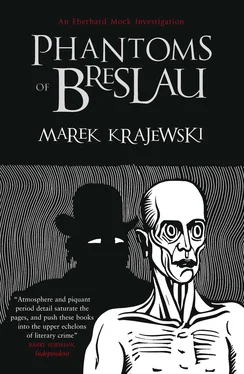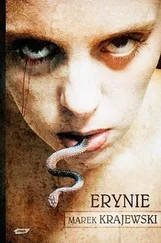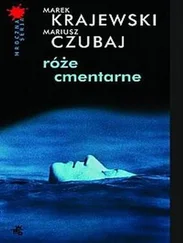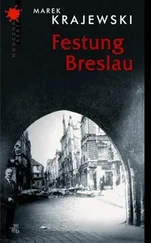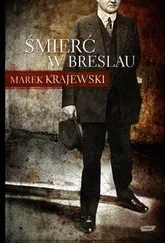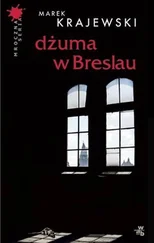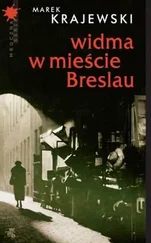Marek Krajewski - Phantoms of Breslau
Здесь есть возможность читать онлайн «Marek Krajewski - Phantoms of Breslau» весь текст электронной книги совершенно бесплатно (целиком полную версию без сокращений). В некоторых случаях можно слушать аудио, скачать через торрент в формате fb2 и присутствует краткое содержание. Жанр: Полицейский детектив, на английском языке. Описание произведения, (предисловие) а так же отзывы посетителей доступны на портале библиотеки ЛибКат.
- Название:Phantoms of Breslau
- Автор:
- Жанр:
- Год:неизвестен
- ISBN:нет данных
- Рейтинг книги:3 / 5. Голосов: 1
-
Избранное:Добавить в избранное
- Отзывы:
-
Ваша оценка:
- 60
- 1
- 2
- 3
- 4
- 5
Phantoms of Breslau: краткое содержание, описание и аннотация
Предлагаем к чтению аннотацию, описание, краткое содержание или предисловие (зависит от того, что написал сам автор книги «Phantoms of Breslau»). Если вы не нашли необходимую информацию о книге — напишите в комментариях, мы постараемся отыскать её.
Phantoms of Breslau — читать онлайн бесплатно полную книгу (весь текст) целиком
Ниже представлен текст книги, разбитый по страницам. Система сохранения места последней прочитанной страницы, позволяет с удобством читать онлайн бесплатно книгу «Phantoms of Breslau», без необходимости каждый раз заново искать на чём Вы остановились. Поставьте закладку, и сможете в любой момент перейти на страницу, на которой закончили чтение.
Интервал:
Закладка:
“They were both questioned by Criminal Assistant Mock,” Smolorz said.
“Correct, Sergeant.” Muhlhaus looked approvingly at Smolorz. “That swine wants to tell us: ‘I’m going to kill everyone you question, Mock. So don’t question anyone. Don’t conduct the investigation.’ Now do you understand why I’m taking you off the case? Who else did you question, Mock? Who have you poisoned? Who else is going to die in this city?”
BRESLAU, THAT SAME SEPTEMBER 4TH, 1919
A QUARTER PAST SIX IN THE MORNING
A prison wagon pulled up outside South Park Hotel. Two uniformed policemen climbed out and ran briskly into the building, swords clanking at their sides. A moment later they emerged holding Kitty by the arms as she thrashed about and tried to bite them in an attempt to break free. One of the men’s shakos was knocked askew. Muhlhaus, Mock and Smolorz watched attentively. Kitty stared at Mock, her eyes full of hatred. He walked up to her and whispered:
“Try to understand, Kathe, it’s for your own good. You’ll be put up in the best single, warm cell for a few days and then you’ll be able to leave.” He moved closer and whispered even more quietly: “Then later I’ll make it up to you …”
The promise did not impress Kitty in the slightest. She spat at Mock, her spittle landing on the sleeve of his jacket. He looked round. All the policemen were smiling to themselves, banking on a violent reaction from the Criminal Assistant. They were disappointed. Mock approached Kitty, removed the wig from her head and smoothed her somewhat greasy hair.
“I’ll visit you in your cell, Kathe,” he said. “Everything’s going to be alright.”
The policemen had no trouble loading Kitty into the wagon. One of them joined her under the tarpaulin while the other took a seat on the box and cracked his whip.
“Commissioner, sir.” Mock wiped his sleeve with a large leaf. “We can set a trap for the killer. He must be following me. Otherwise, how would he know who to kill? It should be enough for me to question someone and then for us to keep a close eye on that person. Kitty, for example. Let’s free her. If we don’t lose sight of her day or night we’ll get hold of that swine in the end. And besides … I want to work for you. Of course, I don’t have to lead this particular investigation, I could …”
“I’m not a street preacher. I don’t repeat myself.” Muhlhaus folded Smolorz’s notes in four. “Besides, we don’t have any other cases on apart from the Four Sailors. Every policeman in town is on the Four Sailors case or, to be precise, Six Sailors counting Ollenborg and Wohsedt. Wohsedt also held the honorary title of Rear Admiral. Goodbye, gentlemen.”
Muhlhaus set off towards the Horch which was just drawing up outside the hotel. He climbed in and Ehlers the photographer, laden with his tripod, tumbled in after him. Doctor Lasarius’ men heaved the stretcher bearing the corpse into their wagon. The engine of the Horch growled and shot a cloud of fumes from the exhaust. The car pulled away but did not go far, stopping beside Mock and Smolorz.
“Just explain one thing to me,” Muhlhaus said, leaning his beard out of the window. “Why are there no signs of torture on Wohsedt’s body when in the letter he wrote to you … I think he expressed it as ‘the man in the executioner’s hood tortured me’?”
“Maybe he meant mental torture.” Lines appeared on Mock’s face, mercilessly highlighted by the bright yellow sun. “Wohsedt wasn’t difficult to break …”
“Are you sure?”
“Of course. One medical term was enough to get him to agree to work for me immediately. He nearly pissed himself in fright.”
“And what term was that?”
“‘Tuberculosis of the skin after being bitten by someone with tuberculosis’,” Mock said, and at that moment he paled. Smolorz knew why. There was one other person Mock had condemned to death because he had questioned her on the Four Sailors case.
BRESLAU, THAT SAME SEPTEMBER 4TH, 1919,
HALF PAST SEVEN IN THE MORNING
Thiemann amp; Co.’s cigar factory was located in the last of the inner yards on Reuscherstrasse. Since it was in full operation until all hours of the night, it gave out stinking fumes, and the clatter of its machinery disturbed the afternoon peace of everyone who lived in the tenements; they never stopped complaining, protesting, even demonstrating, and forming blockades at the gates of the establishment. Eventually the tenement landlords, descendants of Niepold, prevailed on the factory management to open up the establishment an hour later and shut it down an hour earlier. Having worked there for twenty years, even during the time of Mr Thiemann senior, Hildegard Wilck could not get used to the new working arrangements, and the clacking of her wooden clogs could invariably be heard in the inner yard before seven in the morning. And that day — as on every other day — fifty-year-old Miss Wilck stood outside the closed laundry gossiping with the concierge, Mrs Annemarie Zesche. Their interminable conversations drew facetious criticism from Siegfried Franzkowiak, a carpenter living on the ground floor, who did not cease to be amazed at the eloquence of both women. “Those wenches can go on and on about nothing!” he would say to himself.
That day Franzkowiak was in no mood for jokes. He had not slept half the night because little Charlotte Voigten, who lived above him, had been crying. The child’s wailing had been accompanied by the dog’s howling. Franzkowiak had knocked several times on the door of the bedsit which Charlotte’s mother, Johanna, had occupied with her daughter and dog for the past two months. The mother was not in, which did not surprise the carpenter since the entire tenement knew that the city at night was her natural place of work. Some kind person, however, would always look after the child — frequently it was Franzkowiak’s wife — and the exceptionally trusting little girl had always allowed herself to be comforted by her carers. Finally, at about four o’clock that morning, the child had fallen asleep. Silence had descended on the lodgings and Franzkowiak had happily laid his weary head next to that of his spouse. It was hardly surprising that he was truly angry now when, after only a few hours’ sleep, he heard the yapping of the two women.
“Just tell me, Mrs Zesche, what sort of times do we live in? The child lies asleep behind a screen while the mother and some stranger …”
“She’s got to make a living somehow, my dear Miss Wilck. You do the laundry and she lives off men …”
“Animals, that’s what those men are, Mrs Zesche, all they want to do is have it off …”
“And all you want to do is natter!” Franzkowiak yelled, leaning out of his window. “You can’t let anyone sleep, can you, damn it!”
“What’s up with him!” Hildegard Wilck had come to her own conclusions about men. “I’ve seen him going up to her room! An animal, he is! No better than the others!”
“You look after your own arse, not someone else’s!” Now Mrs Franzkowiak had leaned out too, coming to her husband’s defence. “We’re both helping that poor woman! One has to be human, not a swine!”
The shouting in the yard had obviously woken the child because little Charlotte’s crying suddenly erupted again, followed by the rattling of a window being opened. The little girl’s head appeared above the sill. Still sobbing, she shouted something which was drowned out by the dog’s howling. People began to gather in the yard. Charlotte moved a chair closer to the window and stood on it. Tears had traced dirty furrows down her cheeks, and her nightdress was yellow with urine.
From the street came the drone of an automobile and a large Horch drove into the yard. The driver, a sturdy, dark-haired man, squeezed the horn and jumped out. An ear-piercing sound filled the well of the yard, this time occasioned by the passenger, a red-headed man with a moustache. The child fell silent, everyone fell silent, even the dog fell silent. As the two men ran through the gate, Miss Wilck’s voice could clearly be heard in the silence:
Читать дальшеИнтервал:
Закладка:
Похожие книги на «Phantoms of Breslau»
Представляем Вашему вниманию похожие книги на «Phantoms of Breslau» списком для выбора. Мы отобрали схожую по названию и смыслу литературу в надежде предоставить читателям больше вариантов отыскать новые, интересные, ещё непрочитанные произведения.
Обсуждение, отзывы о книге «Phantoms of Breslau» и просто собственные мнения читателей. Оставьте ваши комментарии, напишите, что Вы думаете о произведении, его смысле или главных героях. Укажите что конкретно понравилось, а что нет, и почему Вы так считаете.
